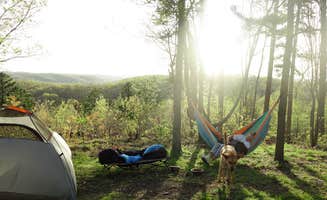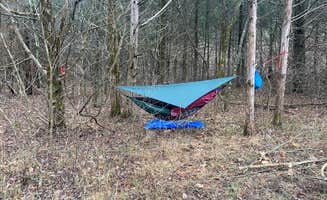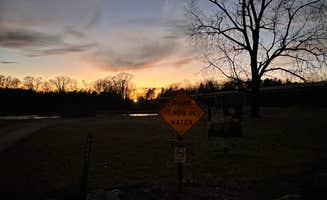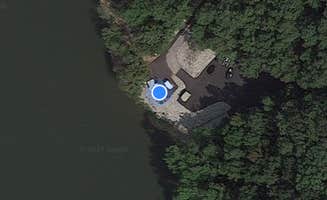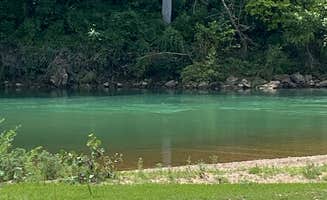Primitive camping near Pilot Knob, Missouri concentrates in the rugged terrain of Mark Twain National Forest where elevations range from 600 to 1,700 feet. This region experiences four distinct seasons with summer temperatures averaging 85-90°F and winter lows often below freezing. Most backcountry sites near Pilot Knob remain undesignated, with campers establishing temporary sites in compliance with forest service guidelines requiring camping at least 100 feet from water sources.
What to do
Swimming and fishing: The Current River at Log Yard Campground offers excellent water recreation options during summer months. "This place is like a hidden treasure. lots of space on the bank to have privacy from other campers, the river was blue and super pretty, and the area was very clean," notes one camper.
Mountain biking: Access miles of backcountry trails from Brazil Creek Camping Area on the Berryman Trail system. A camper reports, "Miles and miles of trails for Mountain Biking, horse riding or just hiking, and you can ride your ATV on the roads but you need an orange triangle."
Wildlife observation: Backcountry campsites near Pilot Knob provide opportunities to observe native Missouri wildlife. At Little Scotia Pond 4x4 Dispersed Site, one visitor mentions, "Great quiet site. Wasn't a bad drive in. Decent amount of wild life hanging around. Will probably hear the beaver if you stay at one of the two sites by the pond."
What campers like
Solitude and quiet: Many dispersed camping areas near Pilot Knob offer isolation from crowds. At Murphy Overlook, campers value the privacy: "We were the only people along this forest service road and got the prettiest spot towards the end of the road overlooking the mountain across. This camping area is a hidden gem!"
Natural water sources: Big River Primitive Campground provides access to clean, natural water. One visitor notes, "Clean crisp water from the river at its origin. Quiet and perfect."
Dark skies: Remote camping locations offer exceptional stargazing opportunities with minimal light pollution. A camper at Murphy Overlook shares, "Being that far from civilization, there was no light pollution so seeing the stars and getting some night photos is possible."
What you should know
Road conditions: Many backcountry sites require navigating rough forest service roads. At Courtois Creek Dispersed, road conditions vary dramatically: "The other reviews make this place seem terrible. I drive a Toyota Highlander and I did the road with no problem. It is not an ATV trail! There was 1 big puddle and 1 sharp rocky turn that I just went slow through."
Wildlife encounters: Campers should prepare for possible encounters with native wildlife, including bears. One camper at Murphy Overlook reports, "Saw an adult black bear when we left, only about 0.5 a mile from camp. Ran across the road in front of us. Keep that in mind!"
Seasonal challenges: Rainy conditions can dramatically impact access to primitive sites. At Log Yard Campground, campers warn: "If the weather moves in, it would be wise to pack up and move out while you can. If the creek comes up, you may not be able to cross it again."
Tips for camping with families
Water safety: When camping with children near water sources, maintain constant supervision. Log Yard Campground offers beach access but requires caution: "The scenery of this dispersed camping area is definitely a five star for the area. Nice view and access to the Current River. Plenty of stars out at night."
Site selection: Choose established sites with level ground for family camping. At Timberline Lake Dispersed, campers find good options: "Peaceful night, very off the beaten path, need AWD to get there on gravel roads. There is a boat launch that's steep and rough."
Connectivity planning: Most backcountry areas have no cell service, requiring advance planning. At Brazil Creek, connectivity varies: "The Ranger, who was very nice, had good service with AT&T, I had TMobile at my campsite with a booster."
Tips from RVers
Vehicle requirements: Smaller RVs and camper vans navigate forest roads better than large rigs. At Little Scotia Pond, a camper advises: "A small class c or travel trailer might make it into a few sites, best for vans and tents."
Turning space: Limited turning areas at primitive sites require careful planning. One camper at Murphy Overlook notes: "Both are very small where only expert drivers can turn around a trailer. We were here two days and did not see or hear anyone."
Generator etiquette: If using generators in primitive camping areas, be mindful of noise impacts. A Log Yard camper mentions: "The only annoying thing was that when I stayed with my tent on the rocks by the water, all the way at the end, I could still hear the person at the very first campsite with RV generator humming very loudly and it took away a lot of the ambiance of the place."


